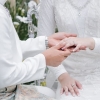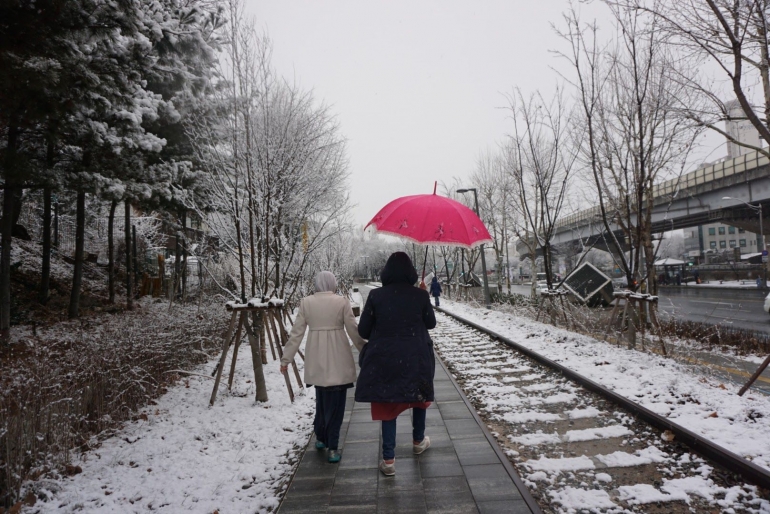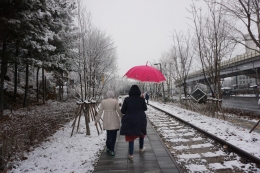This is a piece of mind that I wrote back then during Winter 2018.
Yup, I may have started off this talk in a provocative way---for a good reason. Despite the fact that Korea has begun accepting and welcoming more and more diverse foreigners, there are still some homework need to be done---one of them dealing with an issue I am jotting down right here.
September 2017 was the second time my sister-in-law came to Korea for two weeks and I cannot forget what she told to my wife as she was about to leave Korea. "Sis, now I sense how hard it must've been for you. I don't know how you managed to be patient with all of the stare and glare of people around you."
As I learned more as to what she meant by that, I realized that during her two-week stay in Korea, she had been confronted with two different people at two different locations with the same message of asking her to leave Korea for wearing a hijab. She held back her tears as she recollected those gloomy moments as she has been an endearingly Korea lover.
As someone who has lived in Korea for 6 years, I cannot understand and believe that such happenstance still occur(ing?) in Korea. I live in Korea with my wife who also wears hijab and I could say that despite the fact that we are relatively being accepted for being who we are, I can relate to what my sister-in-law had experienced because my wife has had "rough" moments, too.
Indeed, wearing a hijab during scorching summer days in Korea has always been a tantalizing challenge for a Muslim woman like my wife. But, it is a completely different situation in winter. No one cares about her wearing a hijab! Interestingly, no one has ever asked, begged, or even forced her to remove her hijab in winter like what she (almost always) has experienced during summer days.
This is the reason as to why this particular happenstance (?) has always intrigued me---being her husband. I could not forget the summer days when she came home and retold her being nagged at by strangers on subway, on the bus, or on a sidewalk simply because of her hijab. Again, that never happens (or has yet to happen) in winter. As long as I recollected, I have not heard her retelling any strange or awkward situations during this winter, in particular.
Hmm, has something changed in Korea? Oh, I wish it had.
When almost everyone is draped in long-sleeved, mostly dark-and grey-looking thick jackets along with their visually bulky winter headpieces, wearing a hijab in winter is almost unnoticeably similar to wearing any winter attire. And that is the simplest explanation I could get as to why no one---especially middle-aged women and men---took their time to scrutinize any unfamiliar or probably strange-looking attire like hijab worn by a Muslim woman in Korea. Within this kind of situation, I could easily spot how comfortable my wife has been whenever she walks about around Seoul---in winter! I have not seen any prying eyes or heard any muttering talks about her hijab.
From the perspective of someone who is not wearing a hijab---I could only say that that is probably the perks of wearing a hijab during winter in Korea. Again, I want to assert the fact that---so far during this winter---I have not heard my wife grumbling over any irritating situation she was tossed into; quite different from what she is bound to experience in summer.
Yup, summer has been a struggle for her. I remembered one time she recalled the time when someone intentionally approached her and asked her to remove the hijab. When almost everyone is wearing a thin, light, seemingly breathable fabrics on a hot summer day, headscarves like hijab is easily a frown upon choice of fabric or fashion.
Some people who have never seen any hijab-wearing women right in front of their eyes may easily perceive these women as being obnoxious in their choice of summer fashion. I am not to judge that all people would have that kind of perception, but from what I was told and learned, some of the onlookers simply asserted their sense of uncomfortableness upon looking at the hijab.
Some may even felt a sense of pity for the hijab-wearing women for having to wear the seemingly unbreathable headscarves, not to mention the whole covering attire from head to toes. Yes, I tried to understand the standpoint of a Korean ajumma---in this case---who teased my wife to remove her hijab simply because she was concerned about my wife feeling trapped inside the heat under her dress.
Interestingly---as I pointed out earlier---the cycles of repeated stories about "why- don't-you-remove-your-hijab" nagging ajumma mostly occurs in summer. I do not dare to say that all older generations in Korea would associate hijab with oppression and repression towards women. Nope, I cannot go and talk that far. I think I need to dig deeper into that if I ever want to touch this issue.
Put those issues aside, I noticed that my wife (and probably many other hijab-wearing Muslim women in Korea) prefers wearing light colored hijab that could reflect light and heat. She also has a collection of flowery patterned ones that would easily be associated with openness and moderateness---as compared to the dark-colored ones.
This could be one of the strategies to dodge or avoid any unexpected encounters with anyone who may feel uncomfortable or even discontented with her social appearance. Yup, being a foreigner in a mostly homogeneous country has taught us to learn how to behave and learn the hard way so as not to offend the host.
Of course, she could have just said or defended herself by saying that it is her rights to wear what she wants. But, I think we are on the same page: we are simply temporary residents who do not want to make any unnecessary fuss that would only generate a tolerable issue into a bigger problem. We simply want to practice what we believe in without having to disrupt others.
Harmony---yup, that's the word and the reason why I do not want to talk this issue in a debated manner is because we once had a quite unique experience. It happened when we were on a DMZ (Demilitarized Zone) train tour on a hot summer day in 2016. One woman in her 30s deliberately approached my wife and showed her unwavering interest in the colorful hijab that my wife was wearing.
Long story short, she and my wife went into the train toilet together and the next thing that happened really surprised me. She was wearing my wife's hijab and managed to take a lot of pictures of herself wearing one. I did not know what she was thinking or what was on her mind. But, that particular incident really changed the way we (my wife and I) deal with anyone who are simply smirking, muttering, murmuring, finger-pointing, or even daringly forcing her to take off her hijab in Korea.
It's all about perception!
They have been perceiving us the way they have so far perceived us. We also have been perceiving them the way we have so far perceived them.
Of all so many ways (be it positively or negatively) they might have perceived us, I just want to point out the positive one that I want to jot down here. They might have thought that my wife was suffering from wearing the hijab. That was the a~ha! moment and the moment we tried to stop complaining about how some of Korean society members still find it hard to accept the hijab-wearing women adorning Korean social sphere these days.
Despite the fact that there must be back-door talks about the detestation concerning the influx of hijab-wearing Muslim women (tourists, migrant students, migrant workers) coming to Korea, I personally want to disregard or overlook this fact by instilling a belief into my mind that all of the suspicion and hatred only occur due the perception or misconception about these women.
In fact, the throngs of hijab-wearing tourists from Southeast Asian countries (notably Malaysia and Indonesia) and from the Middle Eastern countries can be seen in Myeongdong, Hongdae, Gangnam, Dongdaemun, for instance. They have partly shaped and brought about the changing perception of Korean society about the "moderateness" of hijab-wearing Muslim women.
I mean, "Come on, if they are the oppressed women---as one might have perceived--, then, how can they travel to Korea and embark themselves in the shopping spree for K- cosmetics, K-Pop stores, etc?"--See, my point?
I just want to assert the fact that it has been a common sight to see the hijabers thronging and marching about their shopping spree in the tourist areas across Seoul. Even public transportation is no exception as a place to spot hijab-wearing Muslim women from around the world in Korea.
To add up an even interesting twist of this seemingly (?) changing perception, Korean Muslim women also began their (probably unintended) journeys of being celebrities---at least in the eyes of other Muslim foreigners. I could point out four (currently) famous Korean hijabers who have partly changed the way Muslim foreigners perceive Korean Muslim society through the perspectives of hijab-wearing Korean young women. They are Song Bora (IG: olaborasong), Ayana Jihye Moon (IG: xolovelyayana), Kang Nayeon (IG: safiyakang), and Kim Miso (IG: kimmiso1194).
The thing that ticks me is that they are highly famous among the circles of foreigners and maybe (correct me if I am wrong) have yet to find its strong-base among Korean younger generations. I am sure they have done their best to promote inter- religious dialogues, inter-cultural dialogues, and cross-cultural understandings that are so desperately needed in Korea in terms of this country's need to put more awareness about Islam into the wider members of its society.
And, I suppose that is the reason as to why they set up their social media accounts. I just hope that what these Korean hijabers have been doing could spark a positive vibe among Korean society about Islam and trigger a more positive attitude from Korean society so as to prevent any awkward and unwanted happenstance as experienced by my wife---to say the least---and also to prevent such happenstance to ever occurring (again) towards the keep-coming Muslim travelers around the world to Korea.
I want to end this talk by once again stating my belief that what happened and (is) happening is all about perception. Things that are naturally contrastive and out of ordinary in the masse could easily be perceived differently by others. My wife wearing a hijab on hot summer day could easily be spotted on and thus being perceived differently by her surroundings. Likewise, I myself still cannot understand as to why some (remember: some, not all) Korean women still dare themselves to wear miniskirts in the cold winter.
I remember this occasion when I saw one and I could not help but said to myself by trying to discern what I just saw. The why-oh-why thoughts kept me awake and made me pondering her reasons. On that particular moment, I perceived her differently. The difference is that, I did NOT approach her and blatantly asked her to cover up---for that would be unthinkable^^!
What I want to convey is that we perceive others based on what we commonly xperienced in our own society. We judge people based on what we learned or grew accustomed with in our life. Just like how the concept of beauty is differently perceived and conceived in different cultures, I tried to use this understanding by trying to understand as to why some ajumma approached my wife and asked her as to whether she was not feeling hot; as to why she was wearing a hijab in the first place; as to why she was not taking it off, etc. Initially, their inquisitives and curiosities did make her upset (and me, of course), but then; as we come to live in Korea for quite some time, we have come to understand their standpoints and perspectives.
Perception goes both ways. As some of the Korean society members perceive hijab-wearing Muslim women in the way they currently understand it; at the same time, these Muslim women (read: Muslim foreigners in Korea in a larger context) also perceive these member of society as individuals who may not have been exposed to the different faades of cultures. Perception can also change. Perception towards others can shift as people change through time and so can the perception of (some) Korean society members towards the hijab-wearing Muslim women in Korea.
So, that's it. I started out this talk by deliberately putting on such a bold title---since it did happen and may happen to others. Yet, I do not want to make a deeper fuss into it. Rather, I have tried to comprehend what happened to some hijab-wearing Muslim women in Korea (including my wife) by stating that it all happened simply out of different perceptions within Korean society---that I believe it will change for the better.
Winter in Korea February, 2018
Note: I do hope that things are getting better in Korea (South, in particular).
Follow Instagram @kompasianacom juga Tiktok @kompasiana biar nggak ketinggalan event seru komunitas dan tips dapat cuan dari Kompasiana. Baca juga cerita inspiratif langsung dari smartphone kamu dengan bergabung di WhatsApp Channel Kompasiana di SINI







